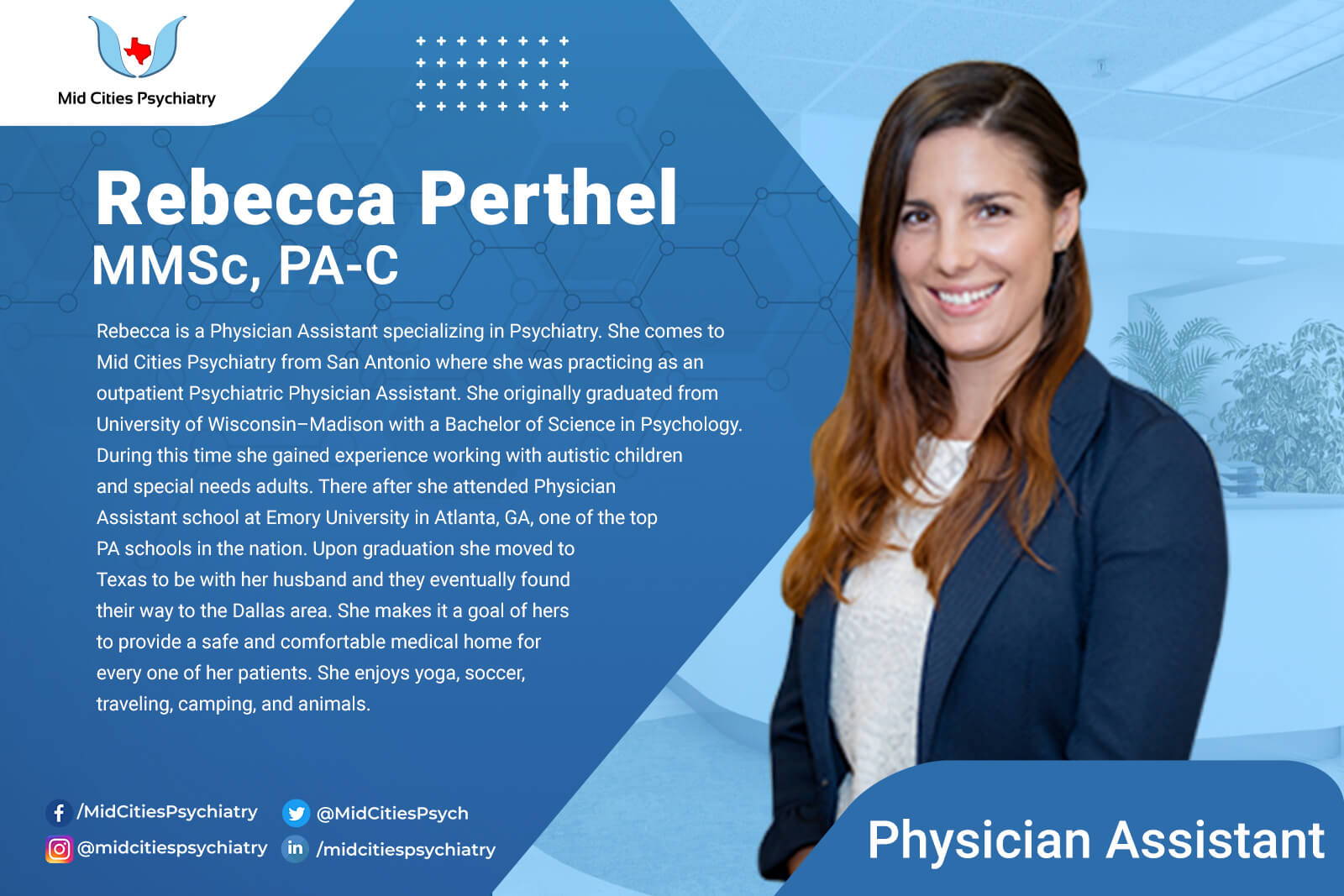In the medical industry, physician’s assistants or PAs are considered vital for the day-to-day operations of a clinic. Considering the amount of care and expertise that’s involved in every unique case, doctors lean on a clinical team that includes PAs with the right specialties.
Mental health centers and private psychiatric practitioners are no exception. PAs are also instrumental in providing quality care to mental health patients who seek treatment and a better chance in life.
It’s for this reason that Mid Cities Psychiatry takes pride in its corps of dedicated and experienced PAs. As one of Texas’s most sought-after mental health centers, we are blessed to have a team of physician’s assistants that are not only capable, but also compassionate.
Let’s meet one of our PAs and know what it’s like to be on the front lines.
The Path to Becoming a PA
Coming from San Antonio with a bachelor’s degree in psychology from the University of Wisconsin, Rebecca Perthel, MMSc, PA-C has been working as Mid Cities Psychiatry’s outpatient psychiatric physician assistant.
Throughout her training, she has gained extensive experience in helping children with autism and adults with special needs.
Rebecca originally wanted to enter medical school, but she found her true calling on a different path.
“I always knew I want to go into medicine, but I did not feel like going through the financial and time commitment of a doctor was the right choice for me,” she says. “After finding out about the PA profession and schooling, it just seemed to fit well.”
With that, she enrolled in the Physician Assistant Program of Emory University in Atlanta.
After moving into Dallas with her husband, she joined MCP’s frontline team that oversees the needs of both doctors and patients.
“As a PA, you are an independent provider under the supervision of a doctor,” she says, adding that the responsibilities include evaluating patients, processing lab results, managing patient medications and treatment plans, and more.
But being trained in handling these needs isn’t enough to help a person become an effective PA.
The Right Skills and the Right Attitude
Like any other medical field, working as a PA offers numerous challenges. Nonetheless, these challenges provide professionals like Rebecca an opportunity to become a better worker, better team player and, more so, a better person.
Despite facing challenging patients, Rebecca remains true to her calling.
“You have to remind yourself that you are there to help,” she says.
Apart from a commitment to serving others, PAs must also exercise a sense of initiative. Like any other medical field, psychiatric medicine requires an eagerness to learn, grow, and do quality work as a result.
For Rebecca, quality work boils down to two things: looking at the details and ensuring efficiency.
“Work smarter not harder,” she adds, “This allows you to get the important details quickly and efficiently!”
And when things get tough, Rebecca turns to this familiar quote: “Teamwork makes the dream work.”
When under pressure, she prefers to stay calm and trust her support system.
“It’s okay to ask for help when you feel you’re having a challenge or blocked,” she says.
It’s All About the Human Factor
Beyond the professional enrichment that comes with working at MCP, Rebecca also cites the close camaraderie she enjoys as a reason for her continued stay at the clinic. The culture at the clinic, she feels, is always, “we work with each other.”
Other than that, there’s also her exposure to people from diverse backgrounds who need more than just a shoulder to lean on.
“You get to see people grow in their mental health,” she says, “And it can be very special.”
Her advice to aspiring PAs in the mental health sector?
“Don’t give up.”
Like Rebecca, you too can achieve your goals while helping others on the road to recovery.
Join us today and make a difference in other people’s lives… and yours, too!

